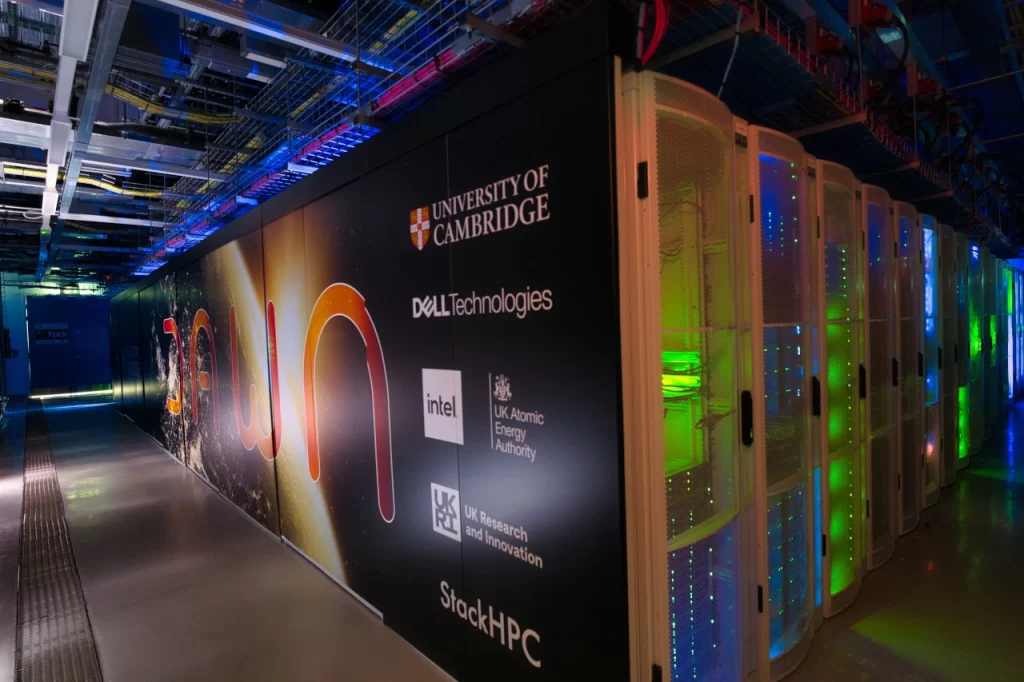The University of Cambridge, Dell Technologies, and Intel jointly declared the Dawn Phase 1 supercomputer operational on November 2. Prominent technical groups constructed the most rapid AI supercomputer in the United Kingdom, effectively using high-performance computing (HPC) and artificial intelligence (AI) to address critical global issues. This paves the way for future technological leadership in the United Kingdom and foreign investment in the country’s technology sector.
As part of the recently established UK AI Research Resource (AIRR)2, Dawn investigates the feasibility of related systems and architectures. Dawn advances the United Kingdom’s progress towards exceeding the computational threshold of one exascale, or one quintillion (1018) floating point operations per second. To provide context, to achieve the processing capacity of one second in an exascale system, each individual on the planet would have to perform calculations for over four years, or 24 hours a day.

Dawn significantly enhances the scientific and AI computing capabilities present in the United Kingdom, and it is currently operational at the Cambridge Open Zettascale Lab, according to Adam Roe, technical director of EMEA HPC at Intel. He stated that Dell PowerEdge XE9640 servers provide an uncompromised platform for hosting the Intel Data Centre GPU Max Series accelerator via oneAPI, expanding the ecosystem’s options.
Additional funding from UK Research and Innovation and a co-design partnership between Dell Technologies, Intel, and the University of Cambridge contributed to the conception of Dawn. Dawn, the most rapidly deploying AI supercomputer in the United Kingdom at present, will assist in executing some of the most substantial datasets ever accumulated in the United Kingdom, spanning both academic research and industrial sectors. Healthcare, engineering, ecological fusion energy, climate modelling, and cutting-edge science in the fields of cosmology and high-energy physics are all domains of application.
A Fresh Start for the Scientific Research Communities in the UK
Dawn Phase 1, which has been deployed and is now operational, signifies a significant advancement in the United Kingdom’s simulation and AI capabilities, according to Dr. Paul Calleja, director of Research Computing Services at the University of Cambridge. The system assumes a significant function within a broader framework, wherein this collaborative endeavour strives to produce a Phase 2 supercomputer by 2024, boasting a performance level ten times that of its predecessor. He added that, if implemented, Dawn Phase 2 would substantially enhance the United Kingdom’s AI capabilities and sustain this fruitful industry collaboration.
Isambard AI supercomputer3 and Dawn Phase 1, which were previously announced, will combine to establish the AIRR, a national facility of the United Kingdom designed to assist researchers in maximising the potential of AI and to support vital research into the technology’s safe and effective application. With the backing of UK Research and Innovation (UKRI), Dawn will significantly enhance the nation’s capacity for AI and simulation computing to facilitate industrial and fundamental research. This will expedite the discovery of new knowledge and stimulate expansion within the UK’s knowledge economy.
The servers comprising the new supercomputer are Dell PowerEdge XE9640 models. The server system possesses liquid cooling technology and a range of configuration options that enable it to manage the requirements of AI and HPC workloads effectively. Alternative air-conditioning systems are less efficient and more expensive to implement than direct liquid cooling technology.
In this system, each PowerEdge XE9640 server is equipped with four Intel Data Centre GPU Max accelerators and two 4th Generation Intel Xeon Scalable processors, which collaborate to provide robust performance and exceptional efficiency when addressing scientific challenges in the real world. Powered entirely by AI and simulation, the Scientific OpenStack from UK SME StackHPC is an environment for cloud supercomputing software. In conjunction with optimised frameworks and the oneAPI open software ecosystem, this enables programmers to accelerate AI and HPC workloads and improve code portability across multiple hardware architectures.
Dawn Phase 1 performance figures and technical specifications will be disclosed during the Supercomputing 23 (SC23) conference in Denver, Colorado, in mid-November.






